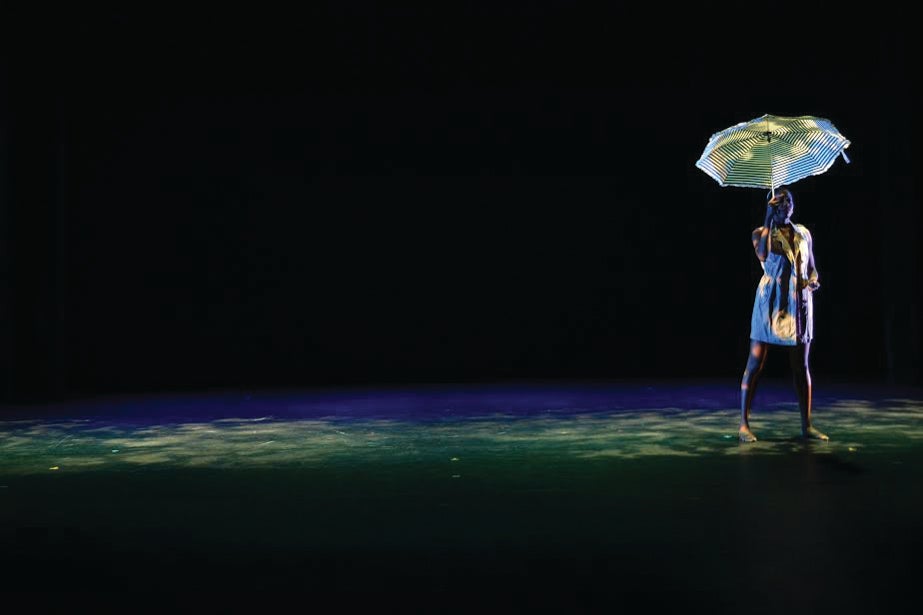Performing Arts Department Adapts to Online Learning, Provides Space for Students to Heal and Grow
The Department of Performing Arts had planned for several events in the Spring 2020 semester, including a concert series, the continuation of the In Your Shoes Project and the theatre production of The Rover. After the transition to online learning due to COVID-19, the faculty and students not only continued with their assignments but also found creative ways to adapt their projects to the new medium.
“Some subscribed to the reductive notion that our department would need to press pause because the performing arts is about bringing people together in live spaces,” Derek Goldman, chair of the performing arts department says. “But I think that this time has actually given way to incredible innovation. Because there was already such a strong sense of community, projects that were already in motion were carried over, and a newly generative and imaginative lens was applied to them.”
Performing Arts as the Glue
Goldman, who is director of the Theater & Performance Studies Program, said that students engaged in several different assignments, including the costume shop practicum and performances by the Georgetown Dance Company and the Chamber Singers and Concert Choir. He said that many students expressed that “performing arts work was the glue that kept them feeling like community and creativity and forward motion was still possible.”
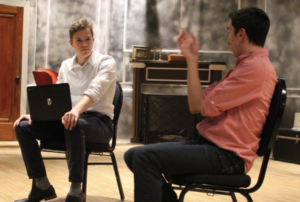
Dialogue and Difference in person meetings at the start of the semester
“It wasn’t just a nice way to let off steam or serve as a good distraction, it became the core of how a lot of students were processing what was happening in the world and engaging with it,” he continued.
Goldman’s own course, Dialogue and Difference: Performing One Another, which is a product of his In Your Shoes Project, provided students with a unique space to more deeply understand the complexities of this moment.
In Your Shoes, which was piloted last year, is a collaborative project with Patrick Henry College, which is an evangelical Christian college, and several initiatives at Georgetown including the Laboratory for Global Performance and Politics that was founded and co-directed by Goldman, the Democracy and Governance Studies Program and the Theater and Performance Studies Program. Ten Georgetown students and 8 Patrick Henry College students from various disciplines participated in Dialogue and Difference, and used deep listening techniques to foster conversations between students across ideological divides.
Students paired off to discuss topics like home, faith or justice in recorded conversations. Each person then chose a precise portion of what was said by their partner during the conversation and then turned this section of dialogue into an ethnopoetic transcript which they then perform in pairs as the other person in a process Goldman calls “Performing One Another.”
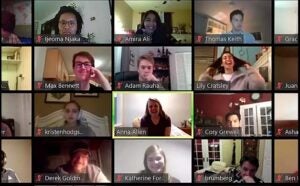
Dialogue and Difference virtual presentations
At the beginning of the semester, these encounters were in person on both the Georgetown and Patrick Henry campuses but shifted to online over Zoom after the pandemic. Goldman said that the backdrop of COVID-19 and the Black Lives Matter movement allowed the class to really dive into the subject matter in an honest way based on their lived experiences.
“The arts inherently reflect and amplify critical issues that are happening in the world, so as the world goes through these crises, it is natural that artistic spaces and creative spaces are the spaces that students and faculty are going to go to in order to understand themselves and others around them to become better and more engaged citizens,” he explains.
The Rover: Ending with a Bang
Traditionally, the theater and performance studies season features three to four major artistic projects throughout the academic year that build towards the production of a play. Last year, Maya Roth, artistic director of the Davis Performing Arts Center, was faced with a tough decision after the start of the COVID-19 pandemic: to cancel the play or not cancel the play?
Roth had begun working on the in-person production of the play, The Rover, as director in the summer of 2019, with a focus on research and adaptation, which continued throughout the school year. The cast, featuring first years through seniors, began rehearsing with her in January and was scheduled to give their first live performance two weeks after spring break, but they never had the chance to put on the live show due to the closing of the school.
After re-imagining the medium, working with CNDLS and coordinating with students, Roth decided that the show must go on, it would just need to happen over Zoom.
“This play was our season finale and it was substantive in scope, with a large ensemble cast, movement and difficult language, and so it was challenging to translate to Zoom,” says Roth. “Theater incorporates so many different elements such as staging, costume and set design, acting and collaboration, as well as interaction with audiences. After we decided to do the performance virtually, we knew that many aspects would be lost, but we also knew that it would bring us joy to complete what we had been working towards.”
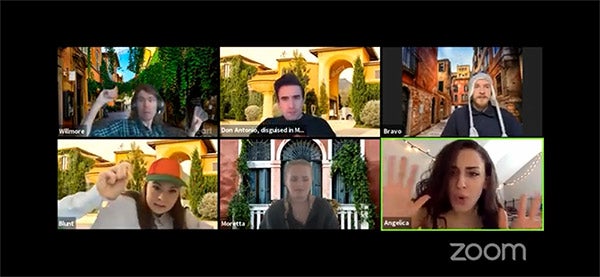
The Rover Reframe Part 2
The Rover, which was written by 17th-century female playwright Aphra Behn and which Roth adapted after years of teaching it, is a comedy set in Italy about gender, cultural crossings, marriage markets and class. The original plans for production included rich costumes and set designs by guest artists that incorporated elaborate masks for the play’s Carnevale created by Ryan Davis (C’21).
Because of social distancing, The Rover (ReFrame) for Zoom had to center on performance—and many aspects of the play, such as the handmade masks, could no longer be used.
“The script had to be changed to work in a Zoom context, and had to redesign for a sensory-full virtual world before many theatres were doing so, without our set, space and costume designs,” Roth says. “However, our sense of community was so profound that despite all of the changes, the cast, student production team and I were able to have fun and experiment with the form.”
The group only had six rehearsals in the Zoom format before the live stream of The Rover and at each session, the ensemble shifted slightly, due to technology, health or timezones. But each person contributed different things to improve the experience of performing online.
Matt Phillips (C’22), an English and classics major, found Italian street and balcony scenes for the actors to use as backdrops. Roth made images from the set model and chose music that evoked Italy’s creative energy and sociality Margaret Gleason (C’22), a theater and performance studies major, coordinated the live stream during the show and made a short video from archives of fight choreography rehearsals.
Roth said that though the live stream was not the ideal scenario, more alumni, parents, family and friends, as well as interdisciplinary faculty and theater artists, from disparate places were able to watch the production than normally would have been able to and that the students blew the audience away. Julia Lo Cascio (N’22) whose family is from Italy, saw her parents dancing with joy to the intermission’s traditional Neapolitan music between acts at home.
She also noted that the cast wrote Letters from Pandemic as if their characters were sheltering in during the plague, engaging with wit, creativity and depth, which inspired Davis’s photoshoot of the masks. When campus reopens, his mask designs will also be on display in the Davis Center, alongside guest artists’ designs, to celebrate The Rover team’s ingenuity and perseverance.
“This moment truly calls for our creative response,” she says. “Part of our essential work is linked to the spirit and the Ignatian idea of whole-person care. Play, like imagination, is something you can do when you have nothing, but it brings joy and changes the givens of the moment.”
From Playing Live to Playlists
Anthony DelDonna, music program director in the performing arts department, taught one of his staple courses Live Music in Context in the spring, which is connected to the Friday Music Concert Series each semester.. For the series, DelDonna collaborated with colleagues in the department and engaged artists locally, nationally or internationally to host 10 performances on Friday afternoons throughout the semester that the students would attend and critique. The Friday Music Concert Series is also open to the university community and the general public.
When the university ceased in-person learning in March, DelDonna had to cancel the five remaining performances, supplementing the material with online concerts from the Kennedy Center and the Met. Though he said that this was helpful for students, DelDonna also wanted to use this opportunity to allow students to process what had happened through their coursework.
“Many students were experiencing significant trauma by being suddenly uprooted from their environment,” he explains. “How do you describe the emotions of a world-wide pandemic, especially when you are 18-20? That’s why I decided to adapt the class so that students could use music as an expression of their personal experiences.”
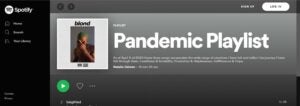
Natalie Gomez’s playlist
DelDonna created an assignment that asked students to curate a personal playlist. Each student was tasked with selecting three songs from the music they had been listening to during the pandemic and then write a reflective piece that described the importance of each song to them.
“I learned so much about each student through this assignment,” says DelDonna. “They really embraced their vulnerability and strength. It emphasized for me that music can express the ineffable.”
Natalie Gomez (C’20) who took Live Music in Context as an elective, said that this class, which was already one of her favorites throughout her time at Georgetown, surpassed all expectations.
“Professor DelDonna is such a funny and understanding teacher, he really thought carefully about our individual well beings and personal balance after we were sent home,” says Gomez. “I had a wide range of emotions when the pandemic first began, and this assignment really allowed me to process what I was feeling.”
Gomez selected Seigfried by Frank Ocean, Baltimore by Nina Simone and So It Goes by Mac Miller. She said those songs demonstrated the progression of her emotions in the pandemic, from sadness to layered disappointment, to acceptance. This is one of the many ways that art allowed students to learn more about their subject matter and themselves.
“The personal playlist will become a staple in this course,” says DelDonna. “It is important to press pause and actively and more carefully think about everyone’s relationship to the larger world and our place in it moving forward.”
